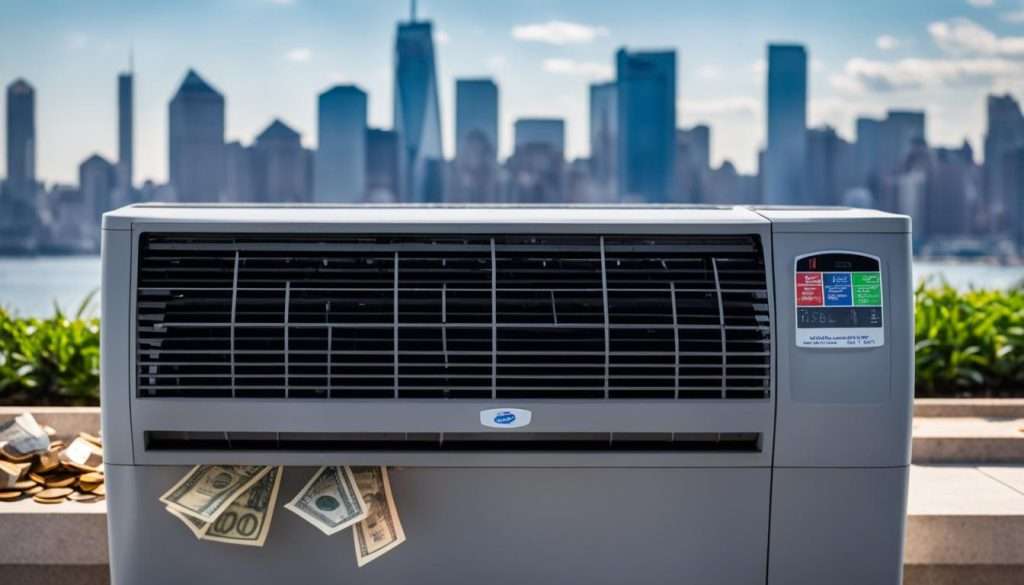When it comes to replacing your AC unit in New Jersey, it’s essential to understand the associated costs. The average cost of central air conditioning installation in New Jersey ranges from $5,200 to $12,000, while the cost of replacing an AC unit, including labor, can range from $2,500 to $7,500. Various factors influence these costs, including the type and size of the unit, efficiency rating, necessary ductwork modifications, and electrical costs.
Working with a professional HVAC contractor is crucial for developing a plan and obtaining an accurate estimate tailored to your specific needs. Whether you need to replace an old unit or install a new one, understanding the costs involved will help you make an informed decision.
Key Takeaways:
- The average cost of central air conditioning installation in New Jersey ranges from $5,200 to $12,000.
- The cost of replacing an AC unit, including labor, can range from $2,500 to $7,500.
- Factors that influence the cost include the type and size of the unit, efficiency rating, necessary ductwork modifications, and electrical costs.
- It is recommended to work with a professional HVAC contractor to develop a plan and get an accurate estimate for your specific needs.
- Investing in a quality air conditioner can lower energy bills and increase the value of your home in the long run.
Factors That Determine the Cost of AC Unit Installation or Replacement
When it comes to installing or replacing an AC unit in New Jersey, several factors play a role in determining the overall cost. These factors include the capacity/power of the system, efficiency rating, necessary ductwork modifications, and electrical costs.
The size of the unit and its efficiency rating can impact the installation or replacement cost. Larger units with higher cooling capacities and energy-efficient ratings typically come at a higher price point, but they may provide better long-term energy savings.
Another factor that affects the cost is the type of ductwork modifications required for the installation. Flexible, sheet metal, or fiberglass ducts are common options, each with its own cost implications. The type of ductwork chosen depends on factors such as durability, maintenance requirements, and budget.
Additionally, the electrical work involved in supporting the AC system contributes to the overall cost. This may include connecting the unit to the electrical grid, installing a new thermostat, or running new wiring. It’s important to consider the complexity of the electrical work and its impact on the installation cost.
By taking these factors into account and consulting with a professional HVAC contractor, you can develop an accurate estimate for the installation or replacement of an AC unit in New Jersey that meets your specific needs.
Size of the Unit and Its Impact on Cost
The size of the AC unit is a crucial factor that influences the cost of installation. Different sizes of central air conditioning units can significantly impact the overall cost. Larger units generally require more cooling power and additional components, driving up the installation expenses. It is crucial to find the right size unit for your home to effectively cool your living space while keeping energy costs down.
Proper installation is vital for the longevity and efficiency of the central air conditioning system. A professional HVAC contractor can help assess your home’s cooling needs and recommend the appropriate unit size for optimal performance and energy efficiency. By choosing the right size AC unit, you can enhance comfort, control cooling expenses, and mitigate potential issues in the long run.
Installing an AC unit that is either too small or too large for your home can lead to inefficient cooling, increased energy consumption, and premature wear and tear on the system. This can result in higher utility bills, reduced comfort levels, and the need for costly repairs in the future. Therefore, investing in a properly sized AC unit during installation can help you save money, enhance indoor comfort, and improve the overall performance of your cooling system.
Unit Efficiency and Its Impact on Cost
When it comes to installing a new AC unit, considering its efficiency is crucial. The efficiency of an AC unit is measured by its Seasonal Energy Efficiency Ratio (SEER) rating, which typically ranges from 13 to 26. Higher efficiency units tend to have a higher installation cost, but they can lead to significant long-term energy savings.
Opting for a highly efficient AC unit may require a larger upfront investment, but it can pay off in the long run through reduced energy bills. These units are designed to use less electricity while delivering the same cooling power as their less efficient counterparts. This translates to lower monthly energy costs and increased energy savings over time.
When considering the cost of installing a new AC unit, it is important to weigh the upfront expense against the potential energy savings. While higher efficiency units may come with a larger price tag initially, the savings in energy costs can help offset this cost in the long term.
Investing in an AC unit with a higher efficiency rating not only benefits your wallet but also the environment. By reducing energy consumption, you can lower your carbon footprint and contribute to a greener and more sustainable future.
Benefits of an Efficient AC Unit:
- Lower energy bills
- Reduced environmental impact
- Enhanced comfort and indoor air quality
- Potential for tax credits or rebates for energy-efficient upgrades
Choosing the right AC unit with an optimal efficiency rating is a smart investment that can save you money in the long run. It’s important to consult with a professional HVAC contractor who can guide you in selecting the most efficient unit for your specific needs and budget.
Ductwork Options and Their Impact on Cost
When it comes to installing or replacing a central air conditioning system, choosing the right type of ductwork is crucial. The ductwork options you select can have a significant impact on the overall installation cost.
There are several ductwork materials available, including flexible, sheet metal, and fiberglass ducts. Each option has its own benefits and drawbacks, so it’s essential to consider your specific needs and budget when making a decision.
- Flexible Ducts: Flexible ductwork is a popular choice due to its affordability and ease of installation. These ducts are made of flexible plastic and can be easily bent and maneuvered around obstacles. However, flexible ducts may not be as durable as other options and may require more frequent maintenance.
- Sheet Metal Ducts: Sheet metal ductwork is known for its durability and longevity. These ducts are made of galvanized steel and can withstand high temperatures, making them suitable for both heating and cooling systems. While sheet metal ducts can be more expensive upfront, they often require less maintenance over time.
- Fiberglass Ducts: Fiberglass ducts are constructed using fiberglass-reinforced plastic. They offer excellent insulation properties and are resistant to moisture and mold growth. However, fiberglass ducts can be more costly than other options and may require professional installation.
When deciding on the type of ductwork for your AC unit, consider factors such as durability, maintenance requirements, and overall cost. Consulting with an HVAC professional can help you weigh the pros and cons of each option and choose the ductwork material that best suits your needs.

Electrical Costs and Their Impact on Cost
In addition to the physical installation of the AC unit, there are several electrical requirements that need to be considered. These electrical costs can significantly impact the overall installation cost of your AC system.
One of the primary electrical tasks is connecting the AC unit to the electrical grid. This involves running electrical wiring from the unit to your main electrical panel. Electrical connections need to be made properly to ensure the unit operates safely and efficiently.
Another essential component of the electrical work is installing a new thermostat. A compatible thermostat is necessary for controlling the temperature and settings of your AC unit. The cost of the thermostat itself, as well as its installation, should be factored into the overall cost of the project.
The complexity of the electrical work required will have an impact on the final installation cost. Sometimes, running new wiring or making modifications to your existing electrical system may be necessary, especially if your current electrical setup does not meet the requirements for the new AC unit. This additional work can increase the overall cost of the installation.
Investing in a high-quality installation is crucial to ensure the efficient and long-lasting operation of your air conditioning system. It is recommended to work with a professional HVAC contractor who specializes in AC installations and has experience with electrical work. They will be able to assess your electrical needs, provide you with an accurate estimate for the electrical work, and ensure that the installation meets all necessary safety standards.
Average Costs for AC Unit Installation in New Jersey
When it comes to installing a central air conditioner in New Jersey, the average cost can vary based on several factors. Most homeowners in the state spend around $4,600 to $9,000, with the average cost averaging at $6,800. However, the total cost can range from $2,100 to $12,000 or even higher, depending on various considerations.
The size of your home is one important factor that affects the installation cost. Larger homes may require a more powerful AC unit, which can increase the overall expense. Additionally, the number of windows, quality of insulation, and the tonnage and SEER rating of the unit selected can impact the installation cost.
It is important to remember that these figures represent the average costs and may not reflect your specific situation. To get an accurate estimate for your AC unit installation, consider consulting with a professional HVAC contractor who can assess your home’s needs and provide a customized quote.
If you’re ready to install or replace your AC unit in New Jersey, it’s important to understand the average costs involved. Keep in mind that the final price will depend on various factors specific to your home. By working with a qualified HVAC professional, you can ensure an accurate estimate and a successful installation.
Conclusion
Installing or replacing an AC unit in New Jersey can be a significant investment. The average cost of central air conditioning installation ranges from $5,200 to $12,000, while replacement costs can range from $2,500 to $7,500. Several factors contribute to the overall cost, including the size of the unit, efficiency rating, ductwork modifications, and electrical costs.
To ensure a proper installation and accurate estimate for your specific needs, it is essential to work with a professional HVAC contractor. They can help you determine the right size and efficiency of the AC unit and guide you through any necessary ductwork modifications and electrical requirements. By investing in a quality air conditioner, you can not only enjoy a comfortable home but also lower your energy bills and increase the value of your property in the long run.
When considering AC unit replacement or installation cost, it is important to take into account the specific requirements of your home, your budget, and the long-term benefits of a reliable and efficient cooling system. With the assistance of a reputable HVAC contractor like D’Auria & Son Heating and Air, you can make a well-informed decision that meets your needs and ensures optimal comfort throughout the hot summer months.
FAQ
How much does it cost to replace an AC unit in New Jersey?
The cost of replacing an AC unit in New Jersey, including labor, can range from $2,500 to $7,500.
What factors determine the cost of AC unit installation or replacement?
Several factors contribute to the cost, including the type and size of the unit, efficiency rating, necessary ductwork modifications, and electrical costs.
How does the size of the unit impact the cost of installation?
Larger units require more cooling power and additional components, which can increase the installation cost.
How does unit efficiency affect installation cost?
Higher efficiency units have a higher installation cost but can result in long-term energy savings.
How do ductwork options impact the installation cost?
The type of ductwork chosen, such as flexible, sheet metal, or fiberglass, can affect the overall cost of installation.
How do electrical costs affect the installation cost?
The complexity of the electrical work needed to support the AC system can impact the overall installation cost.
What is the average cost for AC unit installation in New Jersey?
The average cost of central air conditioning installation in New Jersey ranges from $5,200 to $12,000 or more.
What is the average cost to replace an AC unit in New Jersey?
The average cost of replacing an AC unit in New Jersey ranges from $2,500 to $7,500.
Why should I work with a professional HVAC contractor?
A professional HVAC contractor can help develop a plan and provide an accurate estimate for your specific needs, ensuring a proper installation and reliable service.





